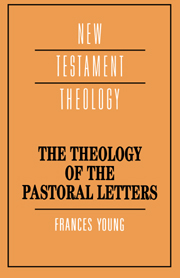Book contents
- Frontmatter
- Contents
- Editor's preface
- List of abbreviations
- 1 Theology and its context
- 2 Theology and ethics
- 3 God and the divine activity
- 4 The importance of sound teaching or What about doctrinal orthodoxy?
- 5 Duties in the household of faith or What about church order?
- 6 The contribution of the Pastorals to the reception of Paul as an Apostle
- 7 The Pastorals as scripture
- Annotated bibliography
- Index of references
- Index of subjects
7 - The Pastorals as scripture
Published online by Cambridge University Press: 01 October 2009
- Frontmatter
- Contents
- Editor's preface
- List of abbreviations
- 1 Theology and its context
- 2 Theology and ethics
- 3 God and the divine activity
- 4 The importance of sound teaching or What about doctrinal orthodoxy?
- 5 Duties in the household of faith or What about church order?
- 6 The contribution of the Pastorals to the reception of Paul as an Apostle
- 7 The Pastorals as scripture
- Annotated bibliography
- Index of references
- Index of subjects
Summary
Paul has been mediated to the church through the tradition of the Pastorals, and the Pastorals have for most of church history been part of the canon of scripture. It is one thing to investigate their origins and their theological interpretation as historical documents; it is another to move from exegesis to appropriation. This we will now attempt.
THE PROBLEM OF THE PASTORALS AS CANONICAL SCRIPTURE
The problem of the Pastorals has been conceived by New Testament critics in the following terms: (I) They are pedestrian, unimaginative, a sad falling away from the greatness and vitality of Paul, lacking in engagement with the issues and real argument with the opponents, doctrinally and stylistically weak and bland. (2) They reflect a ‘bourgeois’ lifestyle of respectability, rather than radical commitment, or engagement with the world–Christians are losing their cutting-edge in society. (3) They are concerned with organisation rather than theology. (4) They are collections of random thoughts and instructions lacking coherence. Compared with Pauline and Johannine theology they are quite simply inferior.
Many of these judgments have been contested in recent literature. In his commentary, Norbert Brox accepted that the Pastorals are later, but insisted that that does not mean inferior–they provided the consolidation needed at the time, and carried the Pauline tradition forward into a new situation. Howard Marshall has pursued these ideas in his Peake lecture, and developed the notion that the Pastorals creatively apply, re-use and adapt the key Pauline ideas within a new situation. The discussions found in this book follow a similar general line.
- Type
- Chapter
- Information
- The Theology of the Pastoral Letters , pp. 145 - 161Publisher: Cambridge University PressPrint publication year: 1994



